|
|
|
Sort Order |
|
|
|
Items / Page
|
|
|
|
|
|
|
| Srl | Item |
| 1 |
ID:
192944
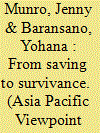

|
|
|
|
|
| Summary/Abstract |
Racism, sexism and gendered violence disadvantage Indigenous Papuan women, yet government responses often focus on individual interventions like ‘raising awareness’ or training. In this article, we build on efforts to challenge these narratives about women's vulnerabilities. We draw on life history interviews with older Papuan women in Jayapura to rethink vulnerabilities and everyday struggles in the context of structural inequalities. We interpret their stories as forms of ‘survivance’ and argue that contrary to dominant perspectives, Papuan women are not economic novices or passive victims. Rather, opportunities have narrowed over time, and women's long history of activity, strategy, persistence and resistance has largely been forgotten. Women's life histories shed light on urban colonialism and Indigenous survivance in Jayapura since the 1940s, when Jayapura was still a Dutch colonial capital and not yet an Indonesian frontier. In a time dominated by concerns about Papuan demise, their experiences are provocative for rethinking vulnerabilities.
|
|
|
|
|
|
|
|
|
|
|
|
|
|
|
|
| 2 |
ID:
192940
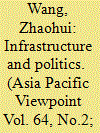

|
|
|
|
|
| Summary/Abstract |
The article seeks to understand the different types and sources of politicisation as well as the consequences for Belt and Road Initiative infrastructure projects. It is argued that while the personalised insulated type of foreign policymaking is conducive to intra-system politicisation, the institutionalised responsive type is associated with extra-system politicisation. While the former type is contingent on political turnovers and brings about abrupt shocks, the latter oftentimes generates societal pushback from socio-economic groups. The article focuses on two flagship Belt and Road Initiative infrastructure projects in Malaysia and Indonesia. Based on fieldwork interviews and process tracing, the article finds that the East Coast Rail Link project in Malaysia has suffered from high risk of political interruption owing to Malaysia's personalised insulated type of foreign policymaking, whereas the Jakarta–Bandung High Speed Rail project in Indonesia has encountered sustained obstacles from Indonesian society and brought about substantial delays under Indonesia's institutionalised responsive type.
|
|
|
|
|
|
|
|
|
|
|
|
|
|
|
|
| 3 |
ID:
192941
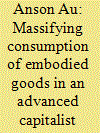

|
|
|
|
|
| Summary/Abstract |
Embodied goods like cosmetic surgery comprise a unique and growing consumer industry, most of all in the Asia-Pacific, yet the rationalisation processes motivating their purchase are less understood. Addressing this lacuna, this article builds upon open-ended surveys and semi-structured interviews of consumers in Seoul, South Korea to articulate a relational approach to examine the rationalisation of purchases of cosmetic surgery as an embodied good. Theorised through the conceptual lens of Bourdieusian capital, participant accounts point to macro-level economic anxieties that inform a micro-level cognitive logic of competition through which consumers rationalise the purchase of embodied goods as a form of aesthetic capital. When performed, this capital is believed to offer actors social distinction that provides workplace and social networking advantages by impressing gatekeepers and alters. Participants are shown to reconceptualise their bodies in a means-end orientation for upward mobility but stress their resignation and powerlessness in being forced to adopt this instrumental reconceptualisation as a response to intensifying economic hardships in contemporary capitalist South Korea.
|
|
|
|
|
|
|
|
|
|
|
|
|
|
|
|
| 4 |
ID:
192945
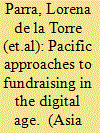

|
|
|
|
|
| Summary/Abstract |
The aim of this paper is to discuss how community relational economic practices in virtual spaces are effective in building resilience because they are borne of and sustained by familiar traditional Fijian values of collective work and social interdependence. The researchers adopted a pandemic-induced methodology, conducting online-based talanoa (fluid conversations between two or more people) with a number of people leading, or involved in, these initiatives. We also engaged with online community groups behind a number of initiatives. Examples are provided of online crowdfunding, livestreaming of concerts to solicit donations, and bartering facilitated by social media sites. To conclude, we stress the enduring nature of communal bonds and traditional systems which Pacific people readily adapt and translate into different forums and forms in the face of challenges such as the restrictions and financial hardships caused by COVID-19. The findings highlight that solesolevaki – a tradition of working together for a common cause – can also occur in the digital era: this demonstrates the deep connection of Fijian peoples and their sense of obligation to one another and to their culture, regardless of where they are in the world.
|
|
|
|
|
|
|
|
|
|
|
|
|
|
|
|
| 5 |
ID:
192947


|
|
|
|
|
| Summary/Abstract |
This study investigates the North Korean defector phenomenon by approaching YouTube as an internet forum for public discourse, using the novel analytic approaches of social network analysis, text mining and semantic analysis. The research produced three main findings. First, individual YouTube content creators are most influential in the video networks pertaining to the subject of North Korean defectors. Second, on YouTube space, the image of North Korea tends to be negative because of the prevalence of defectors' testimony of their life experiences. Finally, such negative narratives of North Korea on YouTube might have a negative influence by blocking the reunification of Korea. In conclusion, this study suggests the South Korean government and other relevant global actors should conduct thorough and continuous examinations of North Korean defectors' perceptions of South Koreans and vice versa. This study calls for the international community to take further action to formulate proper policy instruments.
|
|
|
|
|
|
|
|
|
|
|
|
|
|
|
|
| 6 |
ID:
192946


|
|
|
|
|
| Summary/Abstract |
Well-being is increasingly being promoted and used to describe social progress. However, tension exists between framings that focus on enhancing individual well-being (living well) and societal or collective framings of well-being (living well together). Well-being is central to Aotearoa New Zealand's COVID-19 response and recovery. The COVID-19 pandemic reopened debates about what kind of society people want to live in. Our research explored the ‘shared typical’ or commonality of experiences of the first wave of COVID-19 response in Aotearoa New Zealand. Semi-structured interviews provided insights into a wide range of concerns participants faced and what that meant for their well-being and the well-being of Aotearoa New Zealand. We found that well-being is both multidimensional and hierarchical, and while people talked about their own well-being, it was often in the context of broader social well-being. These findings support research showing that well-being is relational. We suggest that Indigenous models of well-being are well placed to inform policy strategies enabling holistic well-being, but this needs to be done in ways that pair Indigenous and Western knowledge, rather than integrating or assimilating this knowledge into Western science approaches.
|
|
|
|
|
|
|
|
|
|
|
|
|
|
|
|
| 7 |
ID:
192949
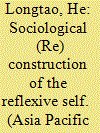

|
|
|
|
|
| Summary/Abstract |
The emergence of a body of work on ethics since the 1990s with a special interest in the self in the Western academia, inspired by Michel Foucault's earlier work, resonates with a concomitant renewed scholarly interest in classical Confucian ethics both in China and internationally. An emphasis on culture and the rejection of a Euro-centric universalist self in these bodies of work accompanies the disavowal of the very possibility of a generic reflexive self. This article seeks to critically examine the ontological positions on the self of these bodies of work, of Foucault's later thoughts, and of classical Confucian ethics. It is argued that there is a theoretical affinity between Foucault's later thoughts and classical Confucian ethics, with both philosophers acknowledging reflexivity as a universally inherited nature of self and making a special consideration of cultural equality and commonality. The examination includes advocacy for a more nuanced approach to notions of cultural equality that relies on targeted research and intercultural dialogue to avoid any predetermining of cultural differences, to allow better-informed appreciation of differences, and to develop a more dynamic conceptualization of culture. This article concludes by initiating a discussion about the design of an integrated approach to cultivate reflexivity through training practices that bring together Foucauldian and Confucian ideas.
|
|
|
|
|
|
|
|
|
|
|
|
|
|
|
|
| 8 |
ID:
192948


|
|
|
|
|
| Summary/Abstract |
Building on the geography of sexualities and queer temporality studies, this research investigates the entanglement of sexuality, time and space with a case study of rural–urban migrant gay men in China. Based on participant observations and in-depth interviews with 46 Chinese rural–urban migrant gay men, we identify three forms of queer temporality – queer biographical time, queer life stage, and queer clock time – emerging from Chinese gay men's life stories. We also demonstrate how these different forms of queer temporality are conditioned by and influence certain spatial practices among our informants. In doing so, this analysis contributes to the geographical research on sexuality by challenging the rural/urban dichotomy in the existing literature on the one hand, and exploring the possibilities for a geography of queer temporality on the other.
|
|
|
|
|
|
|
|
|
|
|
|
|
|
|
|
| 9 |
ID:
192942


|
|
|
|
|
| Summary/Abstract |
In Vietnam's capital city Hanoi, the growing popularity of application based (app-based) motorbike taxis has offered many inhabitants new opportunities to pursue a mobile livelihood with ride-hailing platforms. Nonetheless, as this influx of app-based drivers has hit the city's streets, specific livelihood and mobility frictions have emerged, notably with informal, ‘traditional’ motorbike taxi drivers, or xe ôm. In this paper we analyse these evolving sites and moments of friction and their impacts on driver livelihoods and mobilities for both driver groups. We draw conceptually on debates regarding mobility, platform economies, and urban livelihoods, while specifically interrogating the concept of friction to highlight three possible analytical applications. Methodologically, we interpret static and ride-along interviews completed with over 130 drivers. We highlight a range of tactics ‘traditional’ and app-based motorbike taxi drivers have employed to respond to rising frictions, defend their ‘turf’, and maintain their street-based livelihoods. Driver responses reveal differing access to distinctive forms of social capital and social networks, and contrasting levels of agency regarding their mobilities. By conceptually teasing apart the notion of friction, we wish to expand and deepen understandings of the experiences of vulnerability, precarity, and other impacts of platformisation for different motorbike taxi driver cohorts.
|
|
|
|
|
|
|
|
|
|
|
|
|
|
|
|
| 10 |
ID:
192943
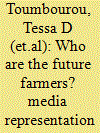

|
|
|
|
|
| Summary/Abstract |
In Indonesia, state and non-state actors frame youth attrition from agriculture as a food security concern and propose policy solutions focused on ‘modern’ farming techniques. Using a critical framing analysis of five national Indonesian news media sources from 2010 to 2020, we examine how government, development and private sector actors portray youth in agriculture, and the underlying assumptions that inform related policy and development agendas. Our analysis reveals contrasting portrayals of youth in agriculture. Youth are often depicted as averse to farming, while also being innovative adopters of modern farming techniques, equipment, and digital technologies. We argue that media frames reflect and reinforce the dominant discourses of state and non-state actors, which have a productivist orientation, proposing technical, capital-intensive agricultural solutions to food insecurity and related issues. News media pays comparatively less attention to structural barriers to youth entry and success in agriculture, such as limited access to land and finance and unfavourable terms of trade.
|
|
|
|
|
|
|
|
|
|
|
|
|
|
|
|
|
|
|
|
|